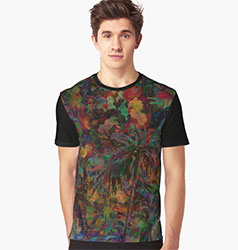Lindy, a young tattoo artist, army veteran, and single mom in Jersey City, New Jersey, drops her son off at preschool, walks into her apartment, rolls a joint, and takes a few hits before washing the breakfast dishes.
She tells the story of a recent altercation with a relative on Facebook, who accused her of being a bad mom because she uses cannabis. What the relative doesn’t know is that Lindy’s a registered New Jersey medical marijuana patient with a diagnosis of PTSD.
“I’m likely to go from zero to sixty if you trigger me just right,” she says. “I don’t mean to let things get to me like that; I try not to, but my brain goes into autopilot and it knows nothing in between calm and tragic.”
Her therapist, who diagnosed her with PTSD and borderline personality disorder, abides by the American Psychological Association[1]’s opposition to using cannabis for PTSD. “She hates that I smoke it,” says Lindy. Lindy has tried other psychiatric medications, but “It seems that I am the poster child for negative side effects. The last meds that were prescribed to me caused permanent nerve damage to my foot.” She went to another doctor to get her medical card.
Cannabis is the only medication that helps calm her, as is the case for so many other patients in New Jersey and New York. Lindy can finally buy her favorite strain, Blue Dream[2], at her local dispensary. Her message to other people who might be thinking about using cannabis for PTSD is: “Do your research.” Thanks to the wealth of strain information at New Jersey dispensaries, that’s more possible now than ever.
Access to Cannabis is Different Across State Lines
On the other side of the Hudson River, in New York City—about a 10-minute trip on the PATH train—massage therapist Rebecca takes a cannabis oil capsule. Like Lindy, she has been diagnosed with PTSD and is registered with her state’s medical cannabis program.
“I personally don’t love smoking actual flower,” says Rebecca. “The ability to have capsule forms of oil as well as the vapes is wonderful. I enjoy the fact that I can buy a pure indica. It’s nice to know what you’re getting, and that [is] exactly what your body needs.”
The problem is, Rebecca doesn’t know anything more about the oil in her capsules; she has no idea what strain she’s ingesting. She knows it’s an indica, she knows the ratio of THC to CBD is 1:1, and that’s it, because that’s how New York dispensaries work.
Furthermore, New York law prohibits dispensaries from selling smokable cannabis; patients’ only consumable options at this time are tinctures, capsules, and vape cartridges.
When Rebecca does want flower, she relies on a client who tips in bud. “The prices [at the dispensary] are extremely high,” she says. When she can afford them, she pays $50 for 20 capsules, and they allow her to sleep through the night. They’re the only thing that ever has.
“Cannabis suppresses nightmares,” says Dr. Michael Gentile, a psychiatrist in Wyckoff, New Jersey, back across the Hudson, who uses a combination of medical cannabis and eye movement desensitization and reprocessing (EMDR) therapy to treat patients with PTSD.
“Cannabis is probably the best all-around sleep medicine there is. It calms the hyperarousal of people who are easily triggered. Until MDMA is approved, I’ll use cannabis and EMDR as my go-to; it’s state-of-the-art treatment for PTSD,” says Gentile.
Cannabis and PTSD
Despite what the American Psychological Association says, Gentile has found that no psych meds come close to the efficacy of cannabis for PTSD patients. “Cannabis is helpful for selective deterioration—disintegration of the traumatic memories by preserving the good memories—as opposed to using a benzodiazepine, where you eliminate all memory, good and bad,” says Gentile.
He’s referring to anterograde amnesia—the lack of the ability to recall long-term memories—a condition that drugs like Valium, Ativan, and Xanax can induce[3].
Gentile recommends that patients he certifies through New Jersey’s medical marijuana program use flower. “You’re not getting the whole effect of the plant if you’re not getting the whole plant,” he says.
He suggests 1:1 CBD:THC strains, and has found the strain Cannatonic[4] particularly effective among his patients with PTSD. Plus, he adds, “New Jersey makes the finest weed in the country.”
The Difficulties of Getting Cannabis
New York City psychiatrist Dr. Ziv Cohen also treats PTSD, and also certifies patients to the state’s medical marijuana program, but says, “Smoking is smoking, and we take our guidelines from the Surgeon General.”
However, he acknowledges that his patients often buy flower from their dealers, since they can’t get it at dispensaries. “That’s problematic because what’s coming from a dealer obviously isn’t quality-controlled. And so the product is going to be less reliable, and it’s also harder to know what’s going on in terms of potency.”
In December 2017, the New York State Department of Health approved the sale[5] of “Additional products including topicals such as ointments, lotions, and patches” and more, but these products are only now finding their way into patients’ hands.
New York’s Curaleaf dispensaries now sell ceramic pods for Volcano vaporizers, and while this is an improvement for patients who prefer flower, it adds a significant expense to that form of consumption.
Product offerings aside, both New York and New Jersey dispensaries can be difficult for patients to access due to distance. As of March 2019, New Jersey has six dispensaries for 53,000 registered patients, and New York has 35 dispensaries for 98,000 patients.
Although both states are rolling out home-delivery programs, many patients still live too far from their medicine. This is particularly detrimental to patients with PTSD, whose trauma-related psychological symptoms may make it difficult for them to leave the house and travel.
The Benefits of Cannabis
In the meantime, Lindy in New Jersey puts the last dish in the drainer and sits down to do her homework. Now that her PTSD symptoms are under control, she’s gone back to college to finish her degree. The cannabis she smoked will help her focus until it’s time to pick up her son from school.
Rebecca in New York heads off to teach a yoga class and give her bud-tipping patient a CBD-oil massage.
Regardless of where these patients get their medicine and what form they take, two women with PTSD are interacting with the world, getting an education, and making a living. Their access to cannabis may not be perfect, but they’re not having nightmares, and that alone is a great gift.
References
- ^ American Psychological Association (www.apa.org)
- ^ Blue Dream (www.leafly.com)
- ^ can induce (www.ncbi.nlm.nih.gov)
- ^ Cannatonic (www.leafly.com)
- ^ approved the sale (www.health.ny.gov)
Read more https://www.leafly.com/news/health/cannabis-access-can-affect-mental-health-treatments
Latest
Coronavirus Strikes Massachusetts Cannabis Company Employees
Reassessing the Essential: Cannabis in the Time of a Pandemic
5 Reasons To Try Aspen Valley CBG Flower (30% Off)
High Times Cannabis Cups Go Virtual In Wake Of Coronavirus Pandemic
Drug Enforcement Administration Proposes Plan To Expand Cannabis Research
Ghana Legalizes Cannabis For Medicinal And Industrial Uses
The cheapest legal weed in Canada: Discover these cannabis ‘value brands’
Cannabis and coronavirus: Here’s what you need to know
cannabis designs
The Best Of
WHO Rules CBD Should Not Be a Scheduled Drug

Dr Cristina Sanchez PhD video interview on medical marijuana and cancer

Biochemist Dennis Hill interview; Cannabis oil as a cure for cancer.

The unofficial World Record holder for cannabis smoking part 1





